August Marmont. Marshal with the label of a traitor
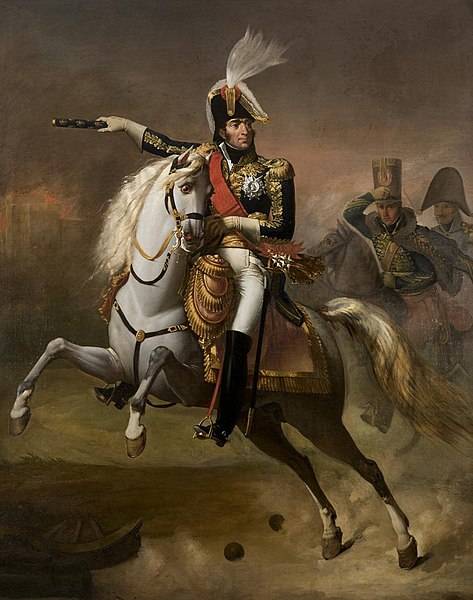
Equestrian portrait of Marshal Marmont, attributed to Jacques-Luc Barbier-Valbonne
Article August Marmont. Faithful friend of Bonaparte we talked about Marmont's youth, his acquaintance with the young Bonaparte, the two Italian campaigns, the Egyptian campaign, the war of the Third Coalition. Today we will continue and finish this story.
Marshal Marmont
In April 1809, after the start of another war with Austria, Marmont, at the head of an army of 10, did not act very successfully against the Austrian troops in Dalmatia. However, after the French victory at Regensburg, the Austrians began to withdraw their units to Vienna, and Marmont was able to go on the offensive.
May 17 Marmont was wounded, but remained in the ranks. In June 1809, he led his army to Graz, and in early July, he approached Vienna, where the main French army was already located. Here, after a three-year break, he met with Napoleon. During the battle of Wagram, Marmont's corps was in reserve, but took part in the pursuit of the defeated Austrians. On July 11, he, having entered the rear of the Austrians near the Taya River, joined them in the battle of Znaim (Znaim). He could not stop them, but his actions made Archduke Karl more accommodating: on July 12, a truce was concluded. After that, Marmont finally received the rank of marshal - simultaneously with Oudinot and MacDonald. At the same time, many contemporaries said that if MacDonald became a marshal at the choice of France, Oudinot - at the request of the army, then Marmont - just at the whim of Bonaparte.
After that, Marmont returned to Laibach (Ljubljana), where he stayed until March 1811, when he was forced to replace Massena, who failed to defeat Wellington, at the head of the Portuguese army.
Marmont in the Pyrenean War
According to the memoirs of contemporaries, Marmont arrived in the Pyrenees with a huge number of servants and cooks, many of whom later accompanied the marshal on all his campaigns. No wonder the Duke of Ragusa was then called by his subordinates "King Marmon". But in the military field, Marmont did not distinguish himself.
Ronald Delderfield gives this assessment to the commanders of the armies of the Iberian War:
Marmont immediately ordered the withdrawal of his army from Portugal. He did not have a relationship with King Joseph - like the rest of the marshals and generals of the Iberian War. The only success of Marmont can be considered the deblockade of the city of Rodrigo. And on June 12, 1812, he surrendered Salamanca to Wellington without a fight. An attempted counteroffensive in July was unsuccessful. At the Battle of Salamanca (July 22, 1812), Marmont was wounded and left the battlefield. Then General Bonet, who took command, was also wounded. The French army was defeated and retreated. According to historians, it was saved from complete defeat by General Clausel, who managed to organize a retreat in relative order. After the defeat of Marmon at Salamanca, there was a clear turning point in the Iberian War. This was Wellington's first major victory, "making a name" for this general. And Marmont was forced to be treated until November 1812. Napoleon learned about the defeat at Salamanca on the eve of the Battle of Borodino. He ordered Secretary of War Clarke to remove Marmont from command of the army and to investigate. Bonaparte said to Caulaincourt:
Clark accused Marmont of having entered the battle ahead of time, because he did not want to transfer command to King Joseph, who was heading to Salamanca with reinforcements.
On December 14, Marmont arrived in Paris, intending to personally explain his behavior, and on the 17th, the 29th bulletin of the Grand Army was delivered to the capital, from which the French learned about the catastrophe in Russia. Following him, on the night of December 18-19, Bonaparte arrived in Paris. Now everyone was not up to Spain.
Marshal Marmont in the campaign of 1813
Until mid-March 1813, Marmont remained out of work and even managed to visit the family castle in Châtillon. Only on March 20 did he receive an order to go to Germany and take command of the VI Corps. Now he was subordinate to Napoleon and, following his orders, acted quite successfully.
On May 2, Marmont's corps fights in the Battle of Luzen. May 9 he occupies Dresden. Then his soldiers participate in the Battle of Bautzen (May 20-21).
At the end of the armistice, Napoleon divides the army into three parts. The first, led by Oudinot, from Bremen was to go to Berlin and fight the Northern Coalition Army, commanded by Bernadotte. The second army, which was located in Dresden and opposed the Bohemian Allied army, was commanded by Napoleon. Marmont's corps became part of Ney's army, which was sent against Blucher's Silesian army. After the denunciation of the armistice (August 10), Marmont's corps was ordered to march on Dresden and took part in the 2nd day of the battle near this city. After the victory, Marmont pursued the Austrians, took many prisoners, but at that time the corps of General Vandam was defeated at Klum, and at the Katzbach, Blucher defeated Ney's army, weakened by the departure of Marmont's corps. Oudinot loses to Bernadotte at Grosse Beren.
The decisive battle of that campaign was the battle of Leipzig, where Marmont was again subordinated to Ney and fought with parts of the Northern and Silesian armies of the allies for 3 days. On October 16, Marmont personally led the attack of the 20th and 25th Infantry Regiments against the Prussians and was wounded in his left arm.
On October 18, his troops were attacked by the Württemburg cavalrymen who had defected to the Allied side, and then by the Saxon infantrymen. Marmont fought bravely, 4 horses fell under him, his hat was pierced by a bullet.
On October 19, Marmont crossed the Elster River a few minutes before the bridge over it was mistakenly blown up. A significant part of his corps remained in the city.
On October 20, Marmont received an order to lead the remnants of the troops of the III, V, VI and VII corps, only about 15 thousand people were subordinate to him. With them, he took part in the battle of Hanau (October 30), where he managed to push back the Austro-Bavarian units of General Wrede.
On November 2, the remnants of the Grand Army crossed the border with France. And on January 1, allied troops entered French territory. At that time, the balance of power was simply depressing: the 47-strong army of Bonaparte against 200 fighters of the coalition armies. However, the military genius of Napoleon and the stamina of his soldiers once again surprised everyone, almost changing the course stories.
1814 Campaign
On January 26, Bonaparte defeated Blucher at Saint-Dizier. After 3 days (January 29), at Brienne, the French defeated the Prussians and the Russian corps of Osten-Saken allied to them. The clash with the army of Schwarzenberg at La Rothiere on February 1 was unsuccessful. But already on February 10, in the battle of Champobert, where Marmont distinguished himself, the Russian corps of General Olsufiev was defeated (its commander was captured by a 19-year-old French recruit). Upon learning of this victory, Napoleon even said:
However, seeing the gloomy faces of the generals standing nearby, the emperor added:
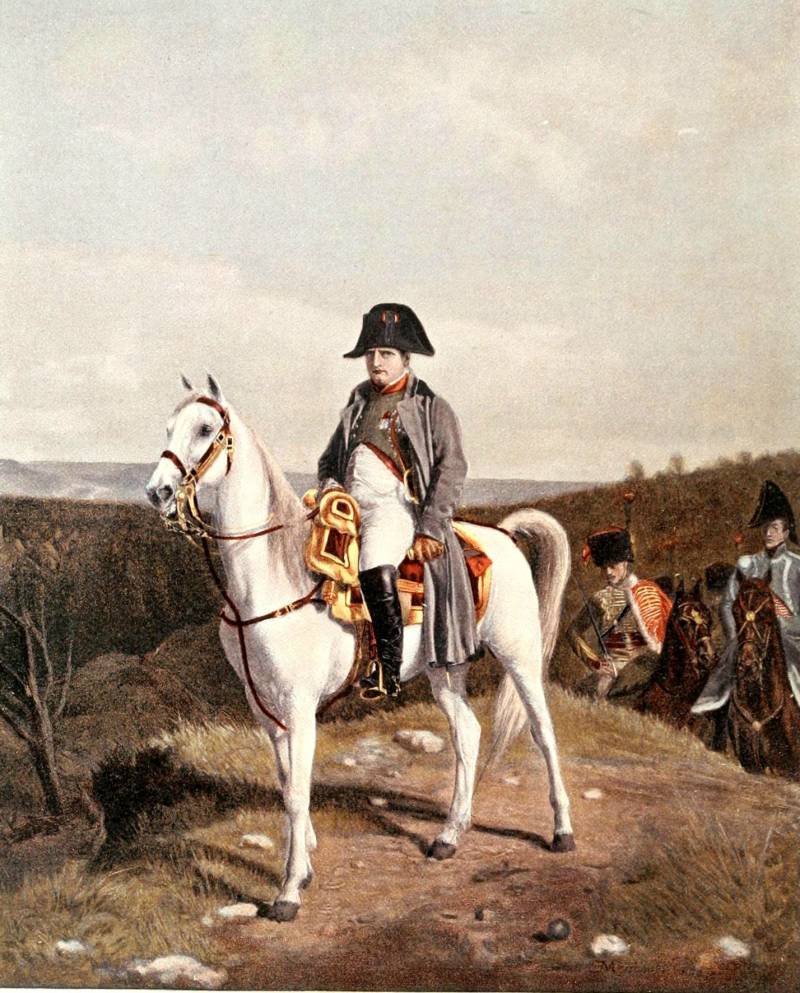
Napoleon Bonaparte in 1814. Illustration from William Milligan Sloan's book The Life of Napoleon Bonaparte
Bonaparte's series of last victories continued. The very next day (February 11), the Allies were defeated at Montmirail. Then they were defeated at Chateau-Thierry.
Marmont successfully acted against Blucher's troops, but in the battle of Laon, his soldiers not only failed to fulfill the order to capture the village of Ati, but also fled, led by the marshal, during the Prussians' night counterattack. Only the unexpected help of a detachment of Colonel Favier who happened to be here helped to avoid a catastrophe. Nevertheless, Marmont retreated 6 miles, and Napoleon became furious, which was shared by Berthier, who later said:
And Bonaparte himself wrote to his brother Joseph:
Many researchers consider this quarrel between the emperor and his marshal fatal. After her, none of them said a single good word about their counterparts.
Meanwhile, left against Schwarzenberg, Oudinot and MacDonald were defeated and retreated. And Marmont still managed to distinguish himself by throwing back Russian troops from Reims, commanded by Count Saint-Prix, who was killed in this battle. And here again there was an unpleasant conversation for Marmont with the emperor, who could not forgive his behavior in the battle of Laon.
Betrayal
On March 20-21, Napoleon managed to defeat Schwarzenberg's army at Ars-sur-Aube. The Austrians escaped defeat, since Bonaparte did not have the strength to pursue them. Further battles in France seemed hopeless to Napoleon. And then a bold plan came into his head - to take his opponents behind him, going into their rear and cutting them off from the Rhine. From the experience of past campaigns, Napoleon knew that the opponents did not dare to leave him "unattended" and therefore he was sure that now they would follow him and his army. It is quite possible that this would have happened. However, the Allies intercepted a courier with a letter outlining this plan. And Talleyrand, who had long betrayed the emperor, strongly advised them to go to Paris.
On March 28, Napoleon learned that two enemy armies were moving towards his capital. He rushed back, but it was too late. On March 25, Mortier and Marmont were defeated in the battle of Fer-Champenoise, and this opened the way for the allies to Paris, to the suburbs of which they approached on March 29. The emperor's brother Joseph gave Marmont permission to enter into negotiations with the enemy - and the purpose of these negotiations was only to save Paris from destruction. Joseph Bonaparte himself and Minister of War Clark fled from Paris that day. The defenders of the capital still held out, but on the night of March 30-31, not knowing that Bonaparte had already arrived at Fontainebleau, Marmont signed a truce and withdrew troops from Paris.
On April 1, Bonaparte arrived at Marmont's headquarters and, after a short conversation with him, returned to Fontainebleau. And Marmont had already entered into correspondence with Schwarzenberg and was inclined to treason.
Marmont himself justified his actions in his memoirs:
However deep my personal interest in Napoleon, I could not but admit his guilt before France. He alone created this abyss that swallowed us...
I have done my duty enough in this campaign ... more than any of my friends have paid in these dire circumstances. These were unprecedented efforts, and didn’t I pay all of Napoleon’s bills with them, didn’t I exceed my tasks and obligations to him? ...
All the generals who were under my command gathered at my place, and I gave them the last news from Paris. The opinion was unanimous. It was decided to recognize the provisional government and join it in the name of saving France.
At this time, other marshals who had previously been loyal to Napoleon considered it possible not to obey him. Marshal MacDonald, for example, refused to attack Vitry, stating:
Sabotaged the orders of Emperor Augereau. In the battle of Geneva, he abandoned his troops, and then surrendered Lyon without a fight. Married to the sister of Bonaparte, the Neapolitan king Murat, together with the Austrians, attacked the possessions of Eugene Beauharnais in Italy. Faithful to Emperor Davout was far away, defending the besieged Hamburg. Marshal Suchet was still in Spain, and Soult fought back to Toulouse, where his army would be defeated in the last big battle of 1814. Moreover, the Senate has already issued a decree removing Bonaparte from power. And the municipal council of Paris issued an appeal to the marshals and generals, in which he urged them to recognize the Bourbon dynasty and go over to the side of Louis XVIII.
Napoleon believed that he could still push the opponents away from the capital and gathered troops. On April 3, he still had an army of 60 thousand people. With him were Berthier and Caulaincourt. Of course, the emperor also counted on 14 thousand soldiers of Marmont, but on the night of April 4, he had already sent a letter to Schwarzenberg, in which he spoke of his readiness to surrender his army to the allies. In exchange, he demanded that the soldiers leave weapon, as well as guarantees for the preservation of the life and freedom of Bonaparte.
The time of Emperor Napoleon was coming to an end. On April 4, old comrades-in-arms came to him - Ney, Oudinot, Lefevre, Macdonald and Moncey. Ney and Oudinot, on behalf of all those present, demanded that Napoleon relinquish power. So far, it was only about his abdication in favor of his three-year-old son. Empress Marie-Louise, the daughter of the Austrian emperor, was to become the regent. Napoleon failed to convince them to continue the fight, the emperor surrendered.
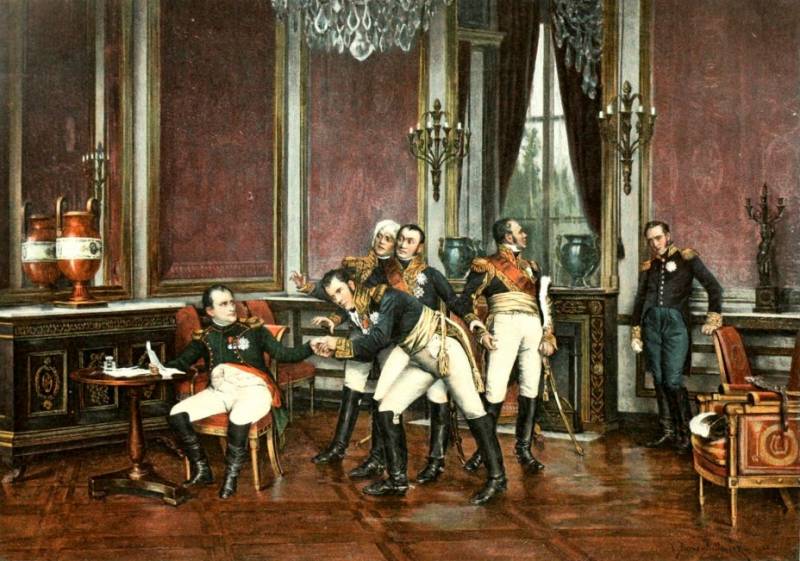
Illustration from W. Sloan's book "The Life of Napoleon Bonaparte", 1896: Napoleon signs the act of abdication. Standing nearby: Marmont, Ney, Caulaincourt, Oudinot, MacDonald. However, Marmont was not actually here.
Having received the signature of Bonaparte, Ney, Caulaincourt and Macdonald went to negotiate with the allies. They were reluctantly joined by Marmont, who had already decided on the betrayal. They had a chance of success, and quite good: at least Austria, which, through Marie-Louise and her son, actually gained control over France, should have treated this plan more than favorably.
The whole combination was broken by the strange surrender of Marmont's army. Napoleon later said:
But Marmont claimed that, having learned about the abdication of Napoleon, he stopped negotiations with Schwarzenberg and, leaving the army to General Souam, went with other marshals to Paris. However, on the night of April 5, his army was surrendered to the Allies. Most researchers agree with Bonaparte, believing that the order to surrender was given by Marmont - before leaving for Paris. However, some believe that in his absence, Suam simply lost his nerve. Colonel Gaspar Gourgo appeared to him, ordering him to appear before the emperor. Later it turned out that Bonaparte, abandoned by everyone, suffered from loneliness and wanted to find a company for dinner. But Suam imagined that it was he who would have to be responsible for the unauthorized abandonment of Paris and "separate" negotiations with the enemy. It should be borne in mind that Suam was previously a friend of the generals Moreau and Pichegru, who were opposed to Bonaparte, and he was even arrested in the Pichegru case. And therefore, he did not hope for the indulgence of the emperor.
One way or another, following the order of Marmont, or acting independently, the general raised the soldiers and led them to Versailles. The soldiers, confident that they were being led to attack the enemy army, unexpectedly found themselves between two lines of armed Austrians. They refused to surrender, and, having escaped from the encirclement of enemies who did not understand anything (these strange French somehow surrendered incorrectly), not controlled by anyone, they went to Rambouillet. Marmont managed to intercept them and direct them to Mantes. Here they were until the end of the Allied negotiations with Bonaparte.
Meanwhile, on April 4, the marshals-delegates met with Alexander I, who listened to them quite favorably, but said that he had to consult with the allies. But already on April 5 he announced that in connection with the surrender of the Marmont corps, we can only talk about the unconditional abdication of Bonaparte.
They say that Marmont then said to the marshals:
The answer was this:
Some authors claim that MacDonald said these words, others claim that Ney said them.
April 6, 1814 Napoleon was forced to sign a new act of renunciation - already on the terms of the allies. He now renounced the imperial throne both for himself and for his son.
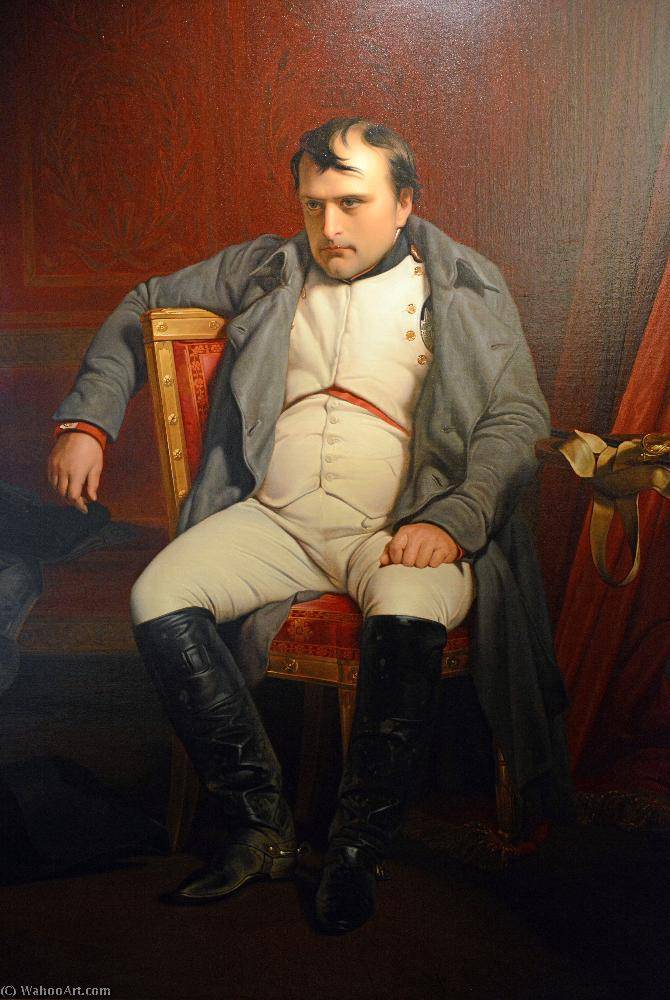
Paul Delaroche. Napoleon after his abdication at Fontainebleau
On April 12, Bonaparte made an unsuccessful attempt at poisoning. April 28, he left Fontainebleau and went to the island of Elba.
Marmont in the service of the Bourbons
It must be said that Marmont did not immediately feel the weight of the people's contempt. He imagined himself the new General Monck and a patriot who had managed to save France from endless wars and reconcile society. Court sycophants called him "savior of the Fatherland”, Louis XVIII granted him the title of peer and retained the title of duke, awarded him the Order of St. Louis. It should be noted that these royal favors did not exceed the awards given to other marshals of Bonaparte. Some of them got even more.
Perhaps Marmont would indeed have remained in the memory of his descendants as a man who saved France from senseless bloodshed, but he was let down by the Bourbons, who, in the words of Talleyrand, “nothing was forgotten, nothing was understood and nothing was learned". Very soon, with the growing disappointment in Louis XVIII and his entourage, the attitude towards Marmont also changed. Even the guardsmen of the 6th company of the royal bodyguards subordinate to him began to be called "company of Judas". But Marmont had nowhere to retreat. He was one of the three marshals who accompanied the king during his flight on the return of Bonaparte, and Napoleon excluded him from the list of marshals. Marmont later voted for Ney's execution. In 1817 he was sent to put down an uprising in Lyon. In 1825, Marmont also became a Knight of the Order of the Holy Spirit. In 1826 he attended the coronation of Nicholas I and received from him the highest order of the Russian Empire - St. Andrew the First-Called. It is curious that he then wanted to inspect the field of the Battle of Borodino, in which he did not participate. Finally, in 1828 he became a member of the Supreme Military Council.
The last years of Marmont's life
Marmont's career ended after the final fall of the Bourbons in 1830. During the July Revolution, he was appointed governor of Paris. Having received the orderclean up the streets”, Marmont hesitated for a long time and missed the time. But then, starting on July 28, he acted with exceptional cruelty, finally burying his reputation in France.
After the abdication of Charles X, Marmont left France forever and wandered around Europe until his death. In Vienna, under an agreement with the local imperial court, for 3 months he “enlightened” the 20-year-old son of Napoleon, the Duke of Reichstadt, trying to convince the young man that his parent was “immoral, evil and bloodthirsty personality". And, I must say, I have achieved some success.
As we said in a previous article August Marmont. Faithful friend of Bonaparte, this marshal died in Venice - March 3, 1852. Later, his body was transported to his hometown of Châtillon and buried in the local cemetery.
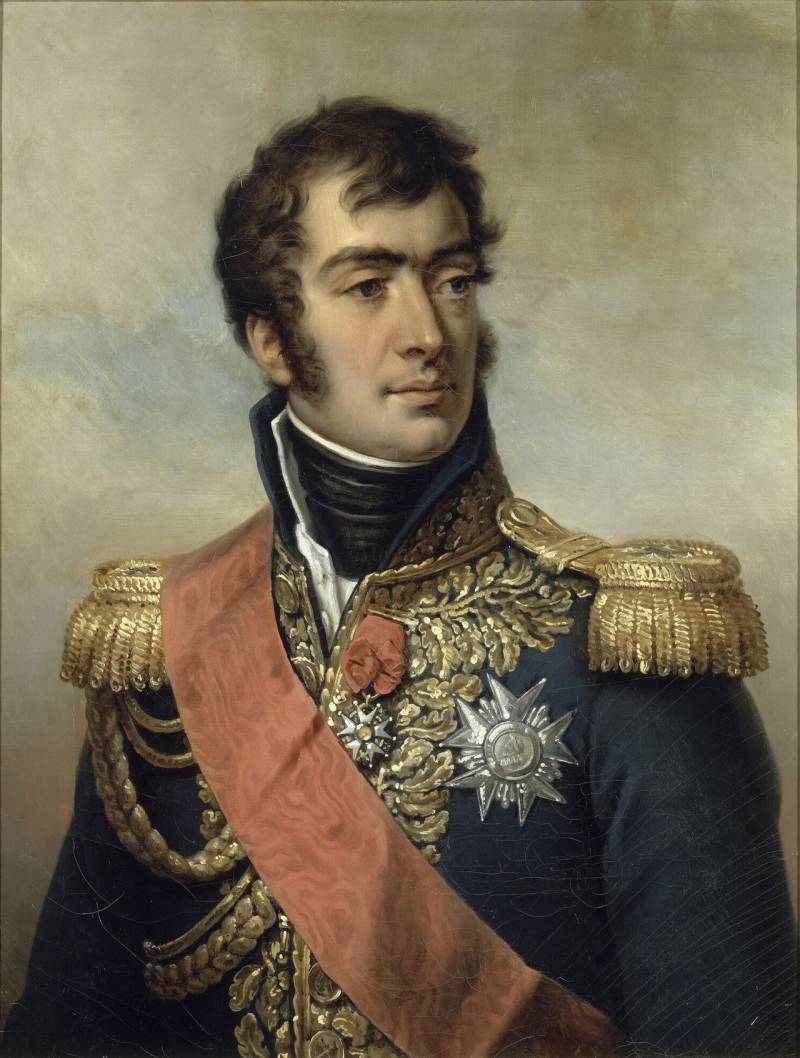
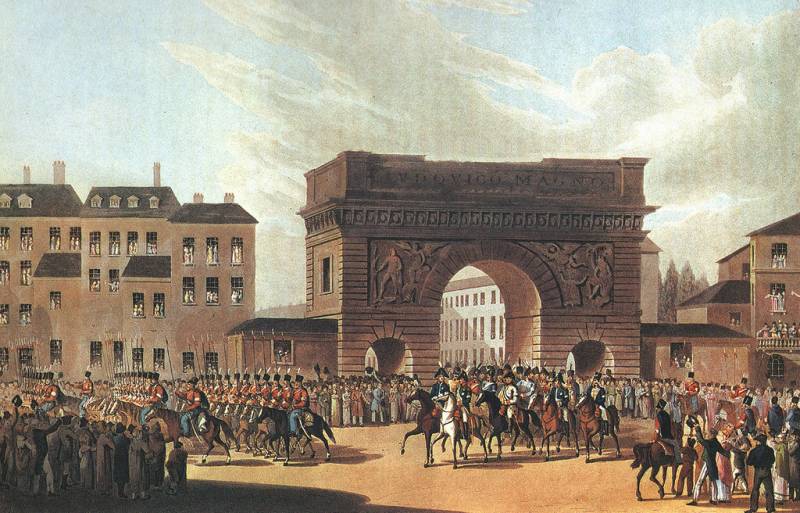
Information